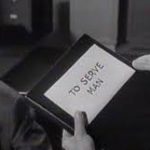Self Examination
 I realized last night that I’m a bigot.
I realized last night that I’m a bigot.
Stephen sent an e-mail to the Speculative Faith columnists with a question that developed into a conversation: Should we list self-published books in the Speculative Faith library?
I didn’t even need to think about it. My answer was no, and my rationale went something like this…
Self-published books are inferior, because:
- There’s no trustworthy quality control for self-published books.
- If a self-published book was any good, it would have been picked up by a traditional publisher.
I thought about it in more depth later, read a couple of related articles, and came to the conclusion I was reacting to the issue out of simple prejudice. “Self-published” equals “bad.”
I’ve accepted this equation for years. Self-publishing is a vanity operation for people who don’t have the patience for legitimate publishing. People who can’t handle criticism and rejection. People too lazy to walk their manuscripts through agents and editors. People who can’t put two coherent sentences together but still think they’re God’s gift to literature.
Those people.
It’s never been a completely accurate assessment. Many authors of renown have plied the murky waters of self-publishing over the years for a variety of personal and practical reasons, not to mention the many great works of classic and ancient literature that were written before publishers existed. It is, however, a lot easier and less expensive to take a story from manuscript to book and place it in the market than ever before—according to Publisher’s Weekly, 764,448 titles were published in 2009 by “micro niche” and self-publishers, compared to 288,355 from traditional publishers. Some of these books and their authors have jumped into the global spotlight, all without benefit of a traditional publishing house.
Let’s take a look at my two supporting points.
There’s no trustworthy quality control for self-published books.
This seems obvious at first glance, but it’s a blanket assessment. Just because there’s no structured quality control in self-publishing doesn’t mean quality control isn’t happening at all. A diligent author will ensure their manuscript is professionally edited and formatted, with attractive cover art, before going to press. If they don’t, the market provides its own quality filter, and shoddy products won’t survive long.
 We also have to be careful about how we define “quality,” because it doesn’t necessarily mean what we think it does when we’re talking about publishing. There are a plethora of impeccably proofread and typeset books produced each year by conventional publishers, and many are pure dreck, from a literary point of view. They’re published because they’re marketable—people will buy them, and publishers are in business to sell books. From that perspective, a quality book is one that provides a good reward-to-risk ratio—a book that will sell, written by an author with a proven track record and audience. Quality in terms of literary merit is a secondary issue.
We also have to be careful about how we define “quality,” because it doesn’t necessarily mean what we think it does when we’re talking about publishing. There are a plethora of impeccably proofread and typeset books produced each year by conventional publishers, and many are pure dreck, from a literary point of view. They’re published because they’re marketable—people will buy them, and publishers are in business to sell books. From that perspective, a quality book is one that provides a good reward-to-risk ratio—a book that will sell, written by an author with a proven track record and audience. Quality in terms of literary merit is a secondary issue.
If a self-published book was any good, it would have been picked up by a traditional publisher.
If a self-published book develops enough of a following, chances are, a conventional publisher will pick it up. In a recent USA Today article, publisher Andrew Martin observes that the pool of self-published e-books is becoming the 21st Century slush pile, one that outsources the labor of slush reading to the market. Books sell, or don’t sell, “…with the cream rising to the top,” and the publishers skim it off.
So, are self-published books inferior? They’re certainly a mixed bag, but I can’t simply say they’re inferior or illegitimate by definition. They emerge from a different publishing model that wasn’t practical until recently. They’re different, but not necessarily of poor craftsmanship. If anything, the ascendance of self-published fiction puts more burden on me to be aware of a larger universe of stories and not to rely entirely on the judgment of the traditional publishing community to determine what is and isn’t worthy of my reading time.
If I’m looking for something different, for the next big thing in speculative fiction, it probably won’t be sitting on the shelves at my local bookstore, where the established writers and their endless sequels reside. It’ll turn up in the electronic marketplace, written by somebody I’ve never heard of before. The big publishers are looking there already—and why should I wait for them to find it?








































Here’s a nice little site that tracks free ebooks when they get offered on Amazon.
http://www.ereaderiq.com/free/
There’s an awful lot of garbage out there. I’ve been trying to read some of it and it makes my brain bleed. So much unedited drivel!
Amen. I get a list from Family Fiction, and that sometimes has good ones.
Well….I admittedly judge books by their covers and movies by their trailers, so….
I self published my first two books in my “Chronicles of Jonathan Steel” and I agree the editorial input I received from iUniverse and then BookPros (now bankrupt) was very minimal. But, both books gained a reading audience, won awards and proved I had a “track record”. I was accepted by my agent, Jeff Jernigan of Hidden Value Group based on the merit of these two books. He subsequently obtained me a five book deal with Realms for this series.
When I re-edited my first book, cutting down the word count to fulfill my contract obligations, it was horrible. My editor, Andy Meisenheimer, saved my rear end. Working with him proved your first point. It was grueling, hard work to rewrite and rewrite until the book was as polished as it could be without scrapping it altogether. The finished product was substantially better than my self-published effort. In fact, the experience was so gratifying when looking at the final product and considering what I learned if I ever ventured into self-publishing waters again, I will only do so after hiring a professional editor to help me “finish” my book.
After reworking the first book, even though I had turned in the second book, I went back and reworked it after what I learned from Andy. He now has that second book in his hands and I expecting his suggestions any day now. Where it has really helped was in finishing the third book. Hopefully, as I move along in the process, the editorial changes will be less and less drastic. My one hope is that, thanks to Realms and my editor, I will continue to improve as a writer and one day be one of your “quality” authors!
Thanks for the honest post. If I had read it when I was still only a self-published author (although I had been a traditionally published author in non-fiction prior to this) I would have been outraged but you honestly speak the truth. Self-publishing moves too quickly because the self publishes make all their money up front, not on subsequent sales. Get that book out there quick and dirty and collect the “fees” up front!
As to your second point, my book must have had some merit to garner the interest of an agent and then a traditional publisher. Self-publishing did teach me the discipline to finish a book and go through the marketing and publicity side of the business. I learned quite a bit. I compare it to going to medical school. You can get your M.D. but just because you walk across the stage and pick up your diploma doesn’t mean you are a doctor. It is that internship year afterwards where you are placed in the crucible of everyday health care that you become a doctor. It is the painful and necessary part of the training that completes you.
Great post!
The first self-published books I’ve read with any quality are Mercury Falls and Mercury Rises by Rob Kroese. The rest were……..such a waste of my money. That’s why I only get self-published books when they are free now.
What would the criteria be for listing a self-published book with SF?
The email loop isn’t quite done yet, to be honest.
And there are a variety of good reasons why it might not be appropriate to list self-published books in the SF library.
The e-mail conversation helped me realize I wasn’t evaluating self-published books on their intrinsic merits–I was dismissing them as a category for reasons I hadn’t thought much about.
If a self-published book develops enough of a following, chances are, a conventional publisher will pick it up. In a recent USA Today article, publisher Andrew Martin observes that the pool of self-published e-books is becoming the 21st Century slush pile, one that outsources the labor of slush reading to the market. Books sell, or don’t sell, “…with the cream rising to the top,” and the publishers skim it off.
I love this line. The ability to self-published ebooks takes excuses away from the hipsters and the would-be elite, who constantly rail against editors and agents as the All Powerful Gatekeepers. These self-publishing outlets have made the reader the new Gatekeeper. Those who felt slighted by industry professionals will now have to complain about being slighted by the people who are supposed to love their books–the readers.
There are a host of other reasons to self-publish. For instance, maybe you don’t want to surrender your copyright rights to a giant corporation for 95 years. If you have any kind of following already, self publishing will bring you more than the 12.7% pittance you’d get with a traditional publisher. Thus, more and more big authors are going self-publish, including Stephen King and J. K. Rowling.
Then there is the financial stress put upon the publishers. With more books published than ever before and more control by the multinational corporations who own the “big six” publishers and all their subsidiaries (comprising about 80% of the whole book market), there leaves less time for your book to be worked on, less money to be invested in a marketing campaign, and even less control over vital areas of your book, like cover art.
Then there’s the matter of access. The big six are after a financial bottom line, not to produce quality art. As a result, they’re more inclined to publish books by previously published authors rather than take risks on unknown talent. Things get more cutthroat all the time. Most of them are closed to slush pile submissions now. The odds of getting picked up by a major publisher diminish with every passing year.
The “quality” problem would be easily fixed if there weren’t such a negative view of self-publishing. If legit editors and writers started offering professional editorial assistance like they would at a big six publisher, they would have so much business they wouldn’t know where to start or stop. Self-pub authors know they need help editing if they have any sort of self-awareness. But that’s mostly unavailable to them because of the perception of self-publishing as beneath the notice of “real” writers and editors and publishers.
Well, this certainly explains why I haven’t seen my own book in the SF Library yet. 🙂
Yes, I have self-published my novel Eric’s War: The Cougar and the Lamb. Why? Control over my work. The experience I had with one publisher/editor left me feeling I no longer had control over my book anymore and it left a bad taste in my mouth. I must say I learned quite a bit from this publisher/editor and my writing improved. I look back on prior versions of my book and see the errors in technique (POV bouncing, show/tell, etc). However, the publisher wanted too much removed to the point I did not like my own novel anymore. I had plans for a trilogy, but the publisher didn’t see it that way. After this particular incident, I hired a freelance editor to help me polish what I had written. I know it’s not perfect, but I believe it’s respectable.
The self-publisher I used was WastelandPress.net. I researched many self-publishers and found them to be one of the best. If you look at the cover of my book, the art is simple, but stunning (to me anyway). They offered as part of their package a set number of hours of copy-editing. I was told for the length of my book, the time allotted would not suffice. However, either the editor breezed through the book (which I admit is possible) or my hired editor did a wonderful job. Their editor found few errors and the last one was within the last few pages of the end of the book.
I do hope you decide to at least consider self-pubbed books on your site. I also hope you’ll consider mine as a possible entry. 🙂
Kenneth,
If it helps, we’re still trying to add previously published books to the Library, meaning that every once in a while we miss one that’s been submitted. So far, there hasn’t been any “ban” on self-pubbed books. Thanks for the reminder, though. We’ll check into it.
Sounds good. It’s been a few months, so what I submitted may have simply vanished. If you like, I could resubmit the info.
Thanks,
Ken
[…] can include traditionally published books, and (following the conversation that Fred referenced here) self-published books. Sure, bad stuff exists among self-published books, but — I speak for […]